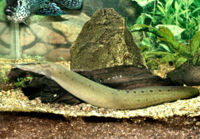Peacock Eel (Macrognathus aculeatus)
From The Aquarium Wiki
(Redirected from Peacock Eel)
Peacock Eel
Macrognathus aculeatus
132 Litres (35 US G.)
20.3-30cm (8-11.8 ")
6.5 - 7.5
23 -28 °C (73.4-82.4°F)
10-15 °d
1:1 M:F
8-12 years
Family
Mastacembelidae
Contents
Additional names
- Peacock Eel, Peacock Spiny Eel, Lesser Spiny Eel, Mountain Spiny Eel
Additional scientific names
- Macroganthus aculeatus, Macrognathus aculeata, Macrognathus aculeatum, Mastacembelus aculeatus, Ophidium aculeatum, Rhynchobdella aculeata, Rhyncobdella aculeata, Rhyncobdella aculeata siamensis, Rhyncobdella ocellata
Sexing[edit]
- Difficult to visually sex, mature females may appear plumper than males.
Tank compatibility[edit]
- Will not harm other fish, although as it gets to a larger size it may view smaller shrimps and fish fry as foods. Tolerant of its own species as well as other Spiny Eel species.
Diet[edit]
- Accepts meaty foods like bloodworms and small shrimp. They can eat flake food as well but will eventually die from a strict diet of just flake food, the flake food should also be fed with bloodworms or small dried shrimp. When larger they can also eat common garden earth worms.
Feeding regime[edit]
- Feed once or twice a day.
- Many owners of Peacock Eels report that during their first days or weeks with these animals, a problem arises where the animal will not eat. During this time, it is important to get the foods they absolutely prefer in order to encourage them to feed. This is not an absolute however, as some will go through this period and others will adapt to feeding, even from their owner's hands, in a couple of days.
Environment specifics[edit]
- As these fish like to burrow, use a soft, sandy substrate in their tank. Incorporate pieces of wood and rock work in order to create more hiding places - but ensure that the rocks are well placed so that they are not undermined by this species' burrowing habits. Plants may get uprooted during their forays.
Behaviour[edit]
- They are usually bottom dwellers during night but can also come to the surface or mid level for food during the day if hungry.
Identification[edit]
- Spiny Eel's are notoriously misidentified by fish stores. The M.aculeatus is identified by having a series of obliquely oriented bars down it's body, the dorsal and anal fins have a row of isolated spines followed by a long continuous soft portion, both fins extending to but not confluent with caudal fin. The pelvic fins are absent. The caudal fin is rounded. They have 14-20 dorsal spines. It is typically brown-grey in colour.
Pictures[edit]
External links[edit]
- Fishbase (Mirrors:
 )
)
